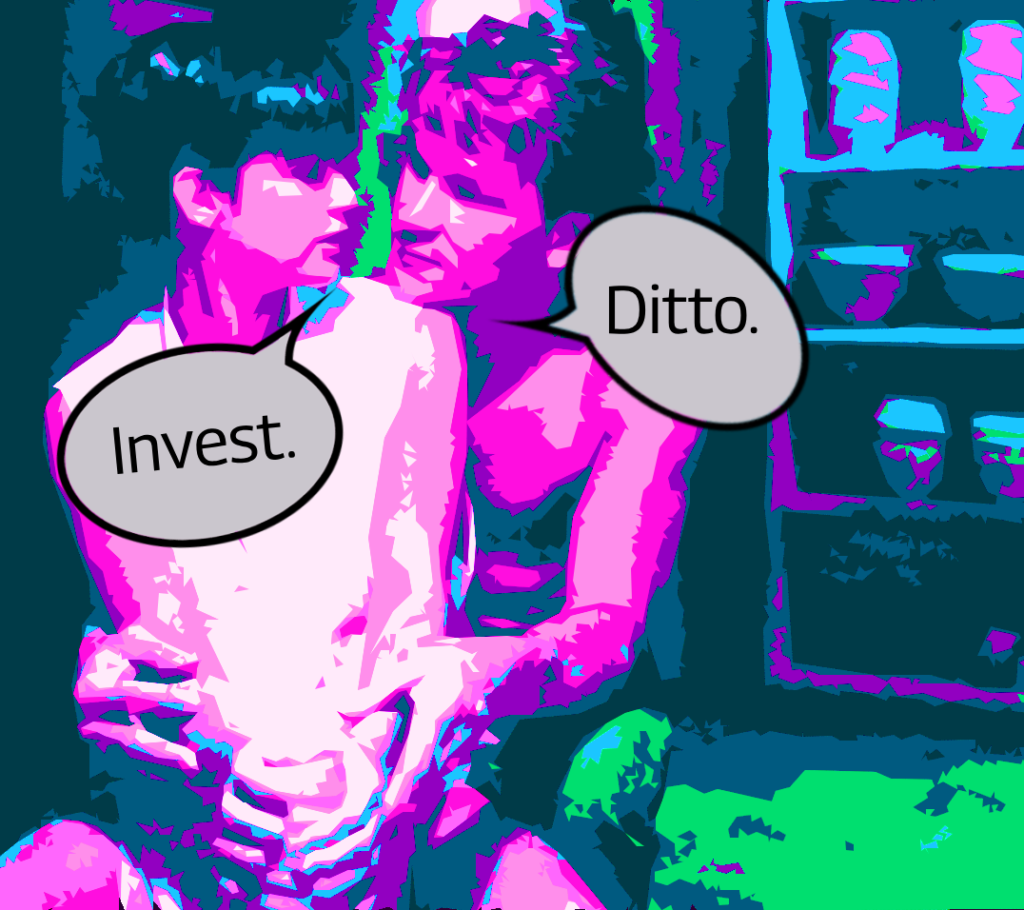
Photo by Smol Fortune
In case you haven’t seen the epic, erotic, and entertaining cinematic masterpiece that is Ghost, consider this your * SPOILER ALERT. *
This article is about to delve into the film’s many monetary teachings while also blatantly discussing its plot points, right…. now.
Ghost centers around Sam, an investment banker and eventual roaming spirit thanks to his supposed best friend and fellow investment banker, Carl.
Carl is laundering money for drug dealers. In order to send them $3,920,000 (as we learn that $80,000 of the four million dollar heap he’s trying to move is his payment for doing so), he needs a book of bank passwords that only Sam has and seemingly carries with him at all times. Because of this, Carl hires a man named Willie to mug Sam and steal the book in the process, but the plan goes awry and Sam is shot and killed.
With the help of the spiritual advisor Oda Mae Brown, Sam must keep his girlfriend Molly out of danger and reveal to her the truth about his murder.
It’s thrilling.
So what exactly are the money lessons of the movie?
Invest
Obviously, four million dollars is a lot of cash (not enough to kill anyone over, as that number does not exist, but it’s still a lot of money). Despite this fact, it’s not as much money as it once was. Ghost was released in 1990 and the purchasing power of $4,000,000 in 1990, is equivalent to that of $9,595,960.21 today (i.e. May, 2024). Over the course of thirty-four years, the money that Carl attempted to launder would need to increase by almost 240% in order to buy the same items it could when originally acquired.
Because of inflation and the incessant corporate need to always increase profits, the value of the dollar is constantly decreasing over time. This means that in order for any money to retain and/or increase its worth, it needs to be placed in vehicles of growth. Hence, Ghost’s first lesson: the importance of investing.
Presumably, since the $4,000,000 from the Ghost plot was laundered money, it probably wasn’t going to be put into reportable, taxable, government-accessible accounts, but let’s say it was.
If $4,000,000 were invested for thirty-four years with all dividends reinvested and an annual estimated average return rate of 7%, it would become $39,912,454.15. That’s a total increase of around 997.8% and exceeds the the 240% increase that was needed to maintain its original buying power.
While these dollar amounts are outrageously large (and a clear example of how easily massive sums of money beget more massive sums of money aka part of why the rich keep getting richer and holding a majority of the world’s wealth), the math behind them is applicable to any invested quantity.
This is because an annual estimated average investment return rate of 7% is based on the S&P 500 (i.e. an index of the 500 largest publicly traded U.S. companies), not how much money you invest.
The S&P 500 is considered a good indicator of the overall U.S. stock market because it encompasses approximately 80% of the U.S. stock market’s market capitalization (i.e. the stocks in the S&P 500 make up approximately 80% of the total dollar value of the U.S. stock market).
Since the S&P 500’s inception in 1957 through the end of 2023, the index has had an annualized average return of around 10%. Taking the average inflation rate into account (around 3% from 1914 to 2024), we then have the formula of: 10% — 3% = a 7% annual estimated average investment return rate. Some might even argue 6% to be safe.
It’s disappointing to think of every dollar earned as immediately losing value, but as Ghost reminds us, investing provides a way to ensure that your non-laundered money has protection from inflation in the long run.
Avoid Unnecessary Fees
Carl suuuucks.
He’s a money launderer for what he’s described to be violent drug dealers, he kills his friend, he creeps around and then tries to make a move on said dead friend’s grieving girlfriend (perfect timing), leads another man to his death (Willie — though there’s an argument that Sam is also partially responsible), and attacks and endangers the lives of many (Oda Mae, Oda Mae’s family, and Molly).
To top everything off, Carl charges a 2% fee for all his sloppy work. He’s taking $80,000 (i.e. a 2% cut) of the $4,000,000 he’s attempting to launder. For God’s sake, the man forgot to include the very simple and most important instruction of “don’t murder him” when setting his money-grubbing plans in motion!
At the core of Carl’s despicable actions, is a finance bro whose only focus is to get paid. This brings us to the second lesson of Ghost: avoid the fees of these greedy little thieves.
Finance in general, but especially investing, is filled with claims that a professional money manager is necessary to maximize your returns. The reality, however, is that they’re just costing you money.
Actively managed funds (i.e. someone making buy, hold, and sell decisions about assets within a fund in an effort to outperform a specific index) often do not do so (despite it being the purpose of their existence), you usually pay higher fees for their “expertise,” and you have to pay even more additional costs whenever the supposed money magicians are trading and fiddling with your money.
According to the SPIVA (Standard & Poor’s Indices Versus Active) 2023 year end report, 60% of all active large-cap U.S. equity funds underperformed the S&P 500 that year. The annual average underperformance rate over SPIVA’s 23 year history is 64%. Why pay for something that likely will not perform?
Instead of actively managed funds, you can explore passively managed funds (i.e. someone carrying out buy, hold, and sell decisions about assets within a fund in order for it to mirror an established index [such as the S&P 500]). Passively managed funds have lower fees and cost you less because trades are made infrequently and less management is involved. Since the fund holds the same or similar assets in the same proportions as whatever index it’s mirroring, the fund essentially matches its behavior automatically.
No one can predict the future and there’s no point of someone trying to prove otherwise on your dime. Sure, not every banker or fund manager is as terrible as Carl, some might be more like Sam, but let’s be real, Sam was apparently hoarding the only copy of a bank’s codes as though he were some kind of crypto-keeper. You don’t want to be a part of their bad decision making.
Listen to Ghost — steer clear of fees promising improbable feats or solely wasting your money (unnecessary investment fees, account minimum fees, maintenance fees, overdraft fees, etc… the recommendation applies to financial fees in general). Let the classic Oda Mae warning of “[your name], you in danger, girl,” enter your mind when you see them.
Nepotism Gets The Job
As awful as the character Carl is, he is an incredible performance of sweat and stress thanks to the actor Tony Goldwyn.
Goldwyn… Perhaps the last name sounds familiar.
Maybe it’s from the film producer, Samuel Goldwyn Jr., Tony’s father. Possibly it’s because of the film studio Metro-Goldwyn-Mayer, co-founded by Tony’s grandfather, Samuel Goldwyn. It could be that you’ve watched a movie featuring the actor Tess Goldwyn or something written by the film and television writer, Anna Musky-Goldwyn, both of whom are Tony’s daughters.
Are we seeing a pattern here? Yes, and it’s the third lesson of Ghost – knowing the right people (whether or not it’s by being related to them) makes a big difference in getting a job. Even Whoopi Goldberg who won an Oscar for her performance as Oda Mae Brown said that she got the role thanks to Patrick Swayze (aka Sam) advocating for her.
This lesson is a bit more behind the scenes of the film, but for all we know, it’s also peppered into the plot. Sam and Carl are close friends and investment bankers. They could have originally met via the “fraternity to finance” pipeline and first greeted each other at a bank’s recruiting reception by exchanging a secret Greek-life handshake.
According to CNBC, research shows that 70% of all jobs are not published publicly on jobs sites and as much as 80% of jobs are filled through personal and professional connections. No wonder it feels like you have to know someone to get hired.
Ghost tells it like it is. “Networking” is just another word for “nepotism” and it’s often what it takes to land a job.
Previously only thought of as a suspenseful motion picture inspiring pottery creation, romance, and the merging of the two, it’s time Ghost be recognized as the plethora of financial knowledge it is. In addition to the lessons above, it also teaches us not to murder for financial gain (something you already knew ), charge for your work (do we ever find out what Willie’s getting out of this deal?), create healthy work boundaries (so many characters would have lived longer as a result — you can’t spend or make money when you’re dead), spread the wealth (Oda Mae donated $4 million)… The list goes on and on, but the words on this page must end.
Go grab some popcorn and let the Ghost-ly wisdom wash over you.






